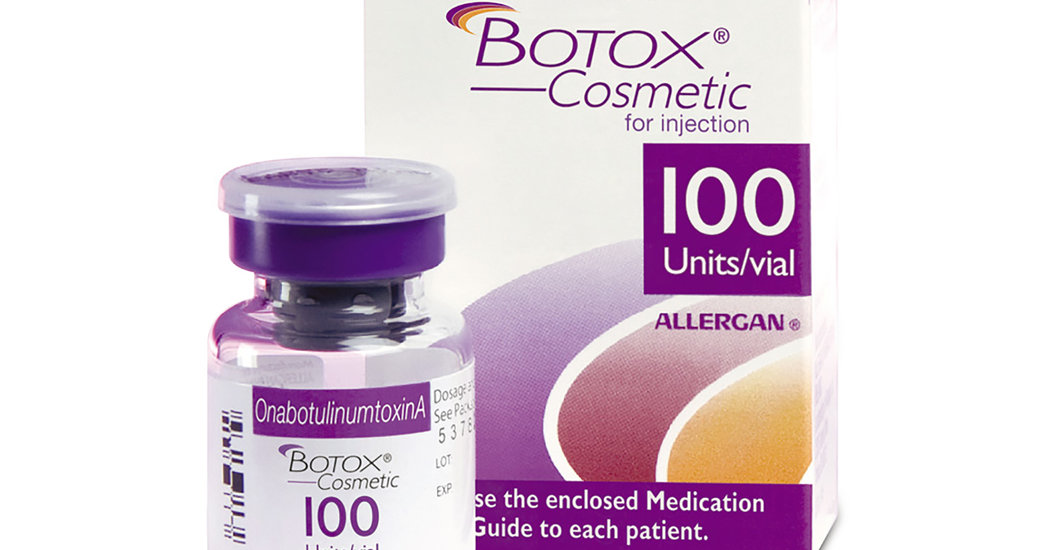
The drugmaker AbbVie said on Tuesday that it planned to buy Allergan, the maker of Botox, for about $63 billion, in one of the biggest mergers in the health care industry this year.
The deal represents a classic response to a perennial drug industry challenge: how to recover when a blockbuster drug is losing its patent protection. In acquiring Allergan, AbbVie gets to bypass the risky process of research and development by buying a portfolio of popular products as it faces the loss of patent protection for Humira, a treatment for rheumatoid arthritis that is the world’s top-selling drug.
It is the second-biggest takeover in the pharmaceutical industry announced this year, after Bristol-Myers Squibb agreed to buy Celgene, a maker of anticancer drugs, for $74 billion, against the backdrop of the health care industry’s mounting interest in such deals.
Buyers have announced $310 billion worth of deals for American health care companies so far in 2019, a record high for the first six months of a year, according to the data provider Dealogic.
Other notable deals this year include the $8 billion acquisition of Loxo Oncology by Eli Lilly and Pfizer’s $11 billion deal for Array BioPharma announced earlier this month.
Last year, the Japanese drug maker Takeda announced it was buying another large manufacturer, Shire, for $62 billion.
Beyond the pharmaceutical industry, consolidation has been transforming the health care landscape, particularly as large insurers join with pharmacy benefit managers, like the recent mergers of Cigna and Express Scripts, and CVS and Aetna. A federal judge is still scrutinizing the terms of the latter deal.
Under the terms of the Allergan deal, AbbVie will pay 0.866 of its shares and $120.30 in cash for each share of Allergan. That is worth about $188.24 a share as of Monday’s closing prices, a premium of nearly 45 percent on Allergan’s share price.
“This is a transformational transaction for both companies and achieves unique and complementary strategic objectives,” Richard A. Gonzalez, AbbVie’s chairman and chief executive, said in a statement. Mr. Gonzalez will remain as chief executive. Allergan’s chief executive, Brent Saunders, will join AbbVie’s board.
Mr. Saunders said that the proposed deal “creates compelling value” for his company’s shareholders and customers.
In buying Allergan, AbbVie is looking for a way to diversify beyond Humira, which — with sales of nearly $20 billion last year — accounted for nearly 60 percent of the company’s total revenue.
AbbVie has built Humira into a huge seller by expanding its approved uses and raising its price, but competing biosimilar versions are already available in Europe and they are scheduled to go on sale in the United States in 2023. Global sales of Humira fell in the first quarter of this year by 23 percent, even as sales in the United States have continued to climb.
Other top products from the company include the cancer treatments Imbruvica and Venclexta, as well as drugs that treat hepatitis C.
In a conference call Tuesday morning, Mr. Gonzalez said the acquisition “will have a profound impact on AbbVie’s overall growth story, while addressing concerns about the company’s reliance on Humira.”
Allergan sells a range of products, but it has also struggled to diversify beyond its line of aesthetic medications and Botox, which has brought in billions of dollars with its expanded use beyond smoothing frown lines to treat migraine headaches and other health conditions.
Allergan’s efforts to protect other brands have stumbled. In 2017, it made an unusual deal to sell its patents for its eye drug, Restasis, to the St. Regis Mohawk tribe in upstate New York in an effort to protect Allergan from a patent challenge. But that effort was challenged and it eventually failed after the Supreme Court declined to take up the case.
In 2016, Allergan’s planned $152 billion merger with Pfizer fell apart after the Obama administration changed the tax rules to make it more difficult for American companies to lower their taxes by using mergers to shift their headquarters overseas. Since then, Allergan, an Irish company whose business is primarily in the United States, has been exploring either a sale or a split.
The Federal Trade Commission, which oversees mergers and acquisitions, appears to be taking a closer look at these deals. On Monday, Bristol-Myers said its deal with Celgene would be delayed and that it planned to sell Otezla, Celgene’s multibillion-dollar anti-inflammatory drug, to address antitrust concerns.
Shares in AbbVie, based near Chicago, were down 16 percent at the close of trading on Tuesday, while Allergan shares were up about 25 percent.

